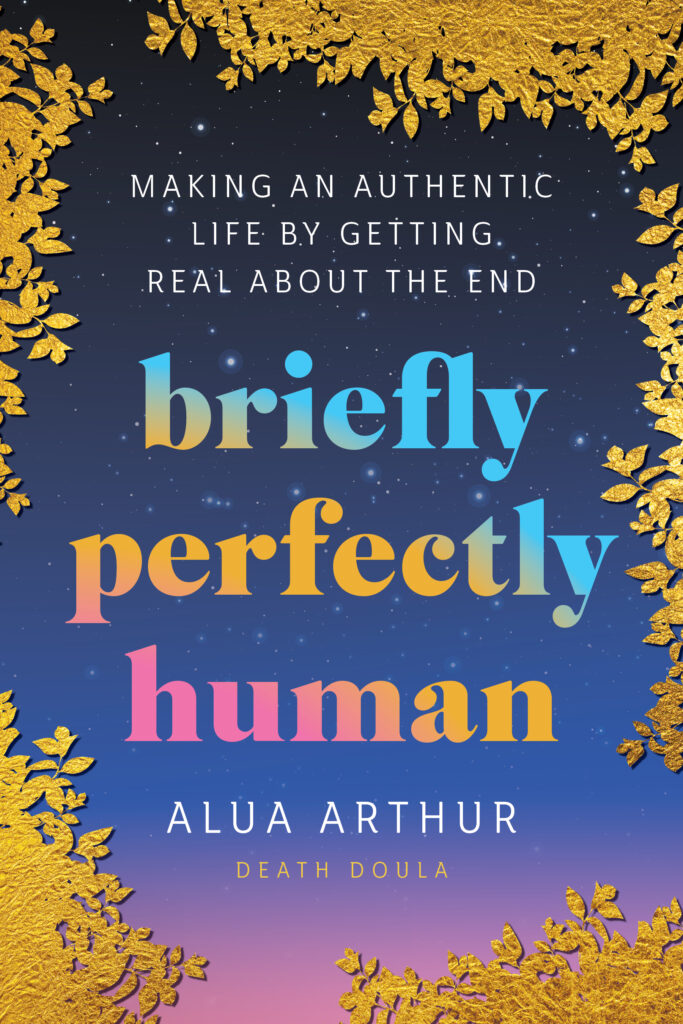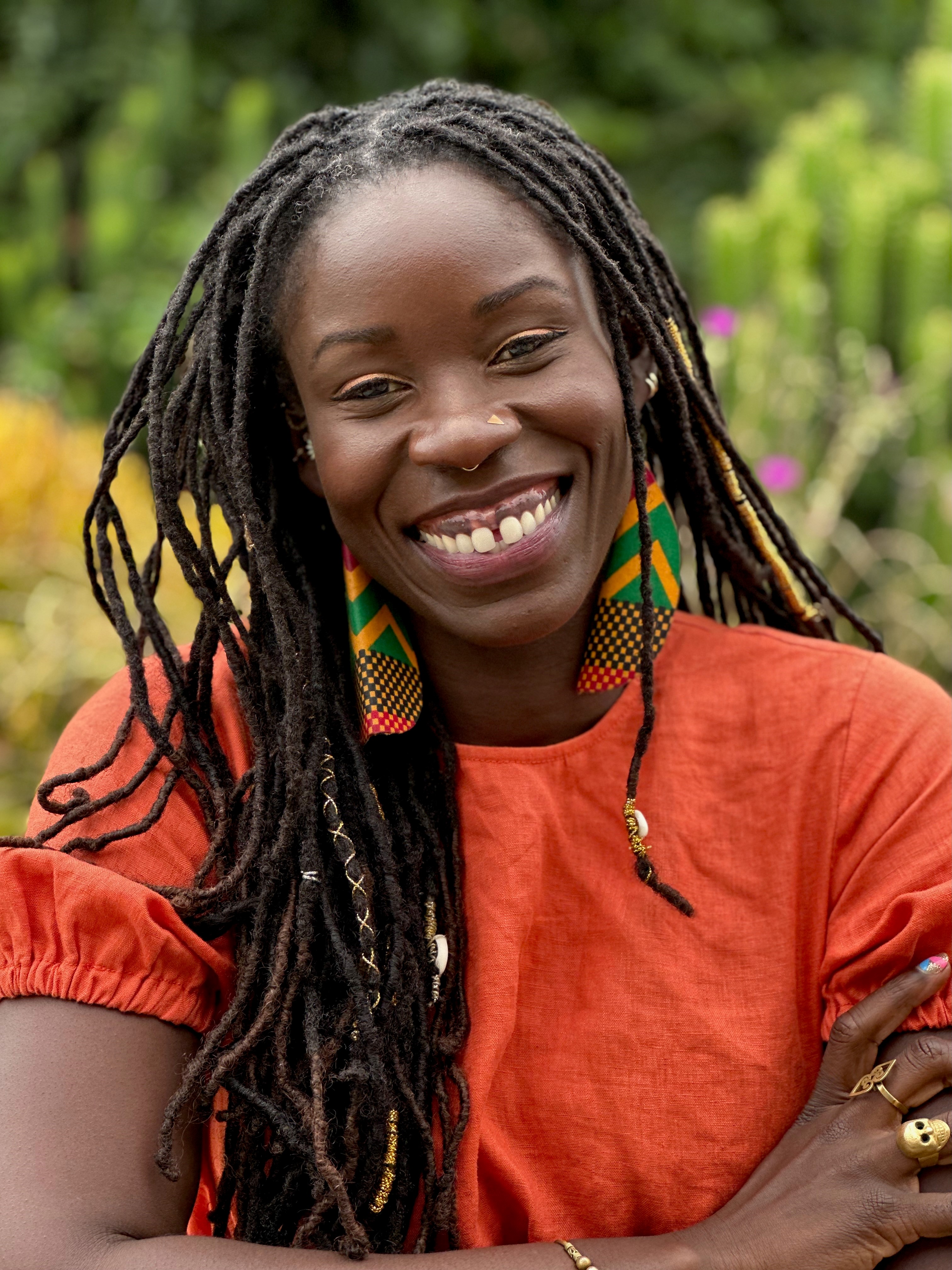A week or so after Peter’s funeral, I couldn’t focus on any tasks. And there was so much to do. Maybe it was the grief, or maybe it was the utter lack of boundaries and self-care that depleted me. Patrick had repeatedly asked me to come to Germany to be with him. I would swear to him that everything was okay, but my sweet boyfriend encouraged me to let him take care of me for a while. After a few days of insisting that I was fine but not being able to remember how to put pants on (Do you sit down to do it? Does the button go first or the zipper? Fuck it, I’ll wear a skirt), I agreed with him. Maybe it was the grief, maybe it was the exhaustion. Thinking about leaving Bozoma alone for the first time in months crushed me, but I was no longer any good to her because I was no good to myself. I was spent and empty. Self-care must be a priority as we usher others toward death. I didn’t know that yet.
Using a pad of brightly colored sticky notes, I sat at the dining room table one afternoon, attempting to quickly outline the tasks that needed to get done so that we could wrap up Peter’s affairs before I left for Germany. I thought I would only use a couple. But one small task quickly ballooned to thirty.
Contact credit card companies and reporting agencies.
Catalogue and close online bills and accounts.
Get access to Peter’s email account.
Figure out what to do with his clothes. Clean his closet now or hold off?
Return medical equipment.
Sort through his mail.
Contact the Social Security Administration.
Locate his birth certificate and insurance policies.
Determine if Peter is subject to probate [the process through which courts legally decide who inherits what, after someone has died].
Find the title to his car.
This last sticky I remember vividly because of the maze of paperwork it triggered. Peter wanted to gift his car—a maroon Mitsubishi Eclipse—to his nephew. I thought all we had to do was give the nephew the keys. So foolish of me to think it would be that simple, or that the rules in place for transferring a car title after a loved one’s death would favor the grieving. No, no—the
process of transferring a title to a vehicle after a death when it hasn’t been properly transferred
in any testamentary document, like a last will and testament or a trust, is a nightmare that even non-grieving people don’t want to carry out. Who wants to sit at the DMV on a regular day, let alone in the midst of deep grief?
There were so, so many instances like this. I’d call a credit card company to tell them that Peter had died, only for them to ask to speak to him to get verification that I was authorized to handle his account. He’s DEAD, asshole. Every time that I had to repeat that he was dead, I fell deeper into the grief pit. And simultaneously the death duties mounted. If I, the valiant juris Doctor–carrying sister-in-law, couldn’t make sense of the myriad things to do to wrap up my
Brother-in-law’s affairs, how could my heavily grieving sister? How could people who don’t have any support at all? The sticky notes filled too quickly. I was a whole pad of little four-by-four-inch
sticky notes in, and hadn’t scratched the surface. I looked at Bozoma sitting on the couch, in pajamas at 4 p.m., her hair still tied back in a scarf, staring into nothingness—while the TV, on the same channel for the past six hours, blared nonsense to drown the emptiness.
At that moment I would have offered a kidney on the black market for someone to help us. Why wasn’t there someone thoughtful, compassionate, knowledgeable, and kind to help? Someone who could explain the order in which to close out Peter’s accounts? That took me at least twelve sticky notes. Or suggestions for what to do with the hospital equipment at home? Six sticky notes. What on earth were we supposed to do with all the leftover medications? Four.
Where would I find out which insurance policies he had? Fourteen. The dining room table was littered in yellow, green, orange, and pink notes that held no answers. Just more questions leading a trail that circled back to the same place. Peter was dead and we didn’t have the
information we needed to wrap up his affairs. It had died with him.
Intellectually, I understood that there were hundreds of thousands of people who were struggling with similar tasks. According to the Medindia medical review’s World Population Clock, over 150,000 people across the world die each day. To some extent, all of them have lives that need closing out after their deaths. Peter was not the first person to die nor would he be the last. Then why did the experience of his death feel so isolating? Why did I feel so alone as I tried to help? And what the fuck kind of society understands the universality of a painful experience but does next to nothing about it? Why do we leave each other alone in our pain? It was like being with Jessica on that bus in Cuba all over again, knowing for sure that she wasn’t the only one who had thoughts about dying, but that she’d been left alone in it. Except this time it was happening in my family.
Heaven help the social worker who told me to do an internet search to figure out the probate process. I cursed their children’s children and they caught all of my anger (read: grief). The hospital suggested that the funeral home could help. The funeral home told me they would call Social Security on our behalf, but that we were on our own with sorting out Peter’s other business. They suggested that I reach out to hospice.
I thought hospice was only a place where people went to die. I was wrong. Hospice is a theory of care, not a place, which shifts the focus from curative to qualitative care, with a specialized team of folks to support that care. People can receive hospice services anywhere. But the medical care team at Peter’s hospital stopped trying to cure him too late so he never got a referral before he died. It felt like he was cheated. The hospice told me that their bereavement services might help with my frustration (read: grief), but that they had no services to help with the bureaucracies I kept finding myself up against. Where were the people who were supposed to help in times like this? We have professionals who guide us through every step of our lives otherwise. Tutors help with schoolwork when we aren’t learning efficiently. Wedding planners help plan weddings. Real estate agents help sell houses. Counselors help navigate relationships. Birth doulas support people through the birthing process. Hell, there are even professional snugglers. So why aren’t there people to help when it comes to the end of a life?
My desire to cure societal ills often fuels my actions. It led me to become a vegetarian as a kid and to enter the professional workforce as a Legal Aid attorney making forty thousand dollars per year, while my law school buddies went corporate and made hundreds of thousands of dollars. My entry into death work was no different. For me, death work is activism at its core. Fueled by anger but cloaked in love.
Most of us who come to the practice of death work come from a similar place. Either we witnessed a death so beautiful and idyllic that we want everyone to experience the same, or we sat by and watched a loved one suffer while suffering ourselves and we never want another to bear the same burden. In both cases, we come to improve the experience for others. I came to death work because I wanted to help “fix” the system I saw.
I wanted to throw a Molotov cocktail at the entire healthcare/deathcare (or lack thereof) apparatus.
I didn’t want anyone else to suffer the way that my family had.
I wanted someone to speak clearly to us that Peter was dying.
I wanted someone to explain the signs of dying.
I wanted the palliative care team to speak their apologies rather than just wear it on their shoulders.
I wanted someone to be there to help sort the bureaucratic mess.
I wanted to make Peter’s death as ideal as it could be, given the fucked-up, my-big-brother-is-dying-from-an-aggressive-cancer-and-I-can’t-help-him circumstances. The death of a loved one sucks for everyone. But what can we do to make it gentler? Just like a child calls attention to an ouchie, we also want to know someone cares that we are hurting.
My displaced anger at sticky notes continues to this day, you should know. But my anger for my sister and for thousands of people caught in the bureaucratic cyclone after a death turned into fuel. If there wasn’t anyone I could call to help me, sure as shit I could be the someone others turned to when their loved ones needed them most. I could remind them that they were doing it right. I could sit at the DMV for them. I could learn about the death rally and explain it to them. I could help them figure out how to talk to their children about death. I could empower them to care for their beloveds themselves. I could be with them in the trenches. I could hold their hands. I could hold their hearts. And while I couldn’t take their pain away, I could let them know that someone cared that it was hard. I could be their witness. I wanted to be.

Excerpted from the book BRIEFLY PERFECTLY HUMAN by Alua Arthur. Copyright © 2024 by Alua Arthur. From Mariner Books, an imprint of HarperCollins Publishers. Reprinted by permission.


